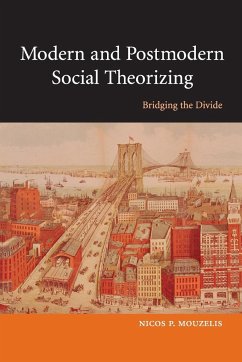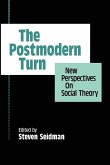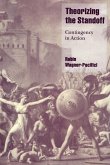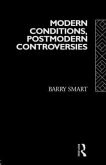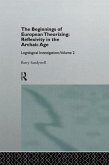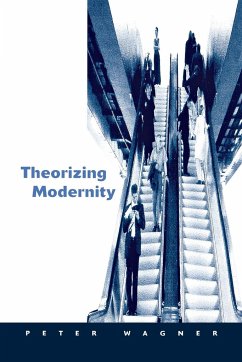Nicos P. Mouzelis
Modern and Postmodern Social Theorizing
Nicos P. Mouzelis
Modern and Postmodern Social Theorizing
- Broschiertes Buch
- Merkliste
- Auf die Merkliste
- Bewerten Bewerten
- Teilen
- Produkt teilen
- Produkterinnerung
- Produkterinnerung
Examines the conflict between modern and postmodern theories in sociology and attempts to bridge the divide between them.
Andere Kunden interessierten sich auch für
![The Postmodern Turn The Postmodern Turn]() The Postmodern Turn46,99 €
The Postmodern Turn46,99 €![Theorizing the Standoff Theorizing the Standoff]() Robin Erica Wagner-PacificiTheorizing the Standoff44,99 €
Robin Erica Wagner-PacificiTheorizing the Standoff44,99 €![Modern Conditions, Postmodern Controversies Modern Conditions, Postmodern Controversies]() Barry SmartModern Conditions, Postmodern Controversies46,99 €
Barry SmartModern Conditions, Postmodern Controversies46,99 €![Theorizing the Americanist Tradition Theorizing the Americanist Tradition]() Theorizing the Americanist Tradition55,99 €
Theorizing the Americanist Tradition55,99 €![The Beginnings of European Theorizing The Beginnings of European Theorizing]() Barry SandywellThe Beginnings of European Theorizing43,99 €
Barry SandywellThe Beginnings of European Theorizing43,99 €![Theorizing Modernity Theorizing Modernity]() Peter WagnerTheorizing Modernity65,99 €
Peter WagnerTheorizing Modernity65,99 €![Postmodern Sexualities Postmodern Sexualities]() William SimonPostmodern Sexualities62,99 €
William SimonPostmodern Sexualities62,99 €-
-
-
Examines the conflict between modern and postmodern theories in sociology and attempts to bridge the divide between them.
Produktdetails
- Produktdetails
- Verlag: Cambridge University Press
- Seitenzahl: 326
- Erscheinungstermin: 10. November 2017
- Englisch
- Abmessung: 229mm x 152mm x 18mm
- Gewicht: 474g
- ISBN-13: 9780521731539
- ISBN-10: 0521731534
- Artikelnr.: 24706037
- Herstellerkennzeichnung
- Libri GmbH
- Europaallee 1
- 36244 Bad Hersfeld
- gpsr@libri.de
- Verlag: Cambridge University Press
- Seitenzahl: 326
- Erscheinungstermin: 10. November 2017
- Englisch
- Abmessung: 229mm x 152mm x 18mm
- Gewicht: 474g
- ISBN-13: 9780521731539
- ISBN-10: 0521731534
- Artikelnr.: 24706037
- Herstellerkennzeichnung
- Libri GmbH
- Europaallee 1
- 36244 Bad Hersfeld
- gpsr@libri.de
Nicos P. Mouzelis is Emeritus Professor of Sociology at the London School of Economics, UK. He has published extensively in the fields of historical sociology, sociology of organizations, sociology of development and social theory He is the author of Modernity: Religious and Ethical Perspectives (2021).
Introduction; Part I. The Theoretical Background: The Development of the
Agency-Structure Problematic: 1. From Parsons' to Giddens' synthesis; Part
II. Parsonian and Post-Parsonian Developments: 2. Parsons and the
development of individual rights; 3. Evolution and democracy: Parsons and
the collapse of communism; 4. Post-Parsonian theory I: neo-functionalism
and beyond; Postscript: Alexander's cultural sociology; 5. Post-Parsonian
theory II: beyond the normative and the utilitarian; Part III. Agency and
Structure: Reworking some Basic Conceptual Tools: 6. Social and system
integration: Lockwood, Habermas and Giddens; 7. The
subjectivist-objectivist divide: against transcendence; 8. Habitus and
reflexivity: restructuring Bourdieu's theory of practice; Part IV. Bridges
Between Modern and Late/Postmodern Theorizing: 9. Modernity: a
non-Eurocentric conceptualization; 10. Ethical relativism: between
scientism and cultural relativism; 11. Cognitive relativism: between
positivistic and relativistic thinking in the social sciences; 12. Social
causation: between social constructionism and critical realism; Part V.
Towards a Non-Essentialist Holism: 13. Grand narratives: contextless and
context-sensitive theories; 14. The actor-structure dimension:
anti-conflationist holism; 15. The micro-macro dimension: anti-essentialist
holism; 16. The inter-institutional dimension: beyond economism and
culturalism; Instead of Conclusion: twelve rules for the construction of an
open-ended holistic paradigm; Appendix: In defence of 'grand' historical
sociology.
Agency-Structure Problematic: 1. From Parsons' to Giddens' synthesis; Part
II. Parsonian and Post-Parsonian Developments: 2. Parsons and the
development of individual rights; 3. Evolution and democracy: Parsons and
the collapse of communism; 4. Post-Parsonian theory I: neo-functionalism
and beyond; Postscript: Alexander's cultural sociology; 5. Post-Parsonian
theory II: beyond the normative and the utilitarian; Part III. Agency and
Structure: Reworking some Basic Conceptual Tools: 6. Social and system
integration: Lockwood, Habermas and Giddens; 7. The
subjectivist-objectivist divide: against transcendence; 8. Habitus and
reflexivity: restructuring Bourdieu's theory of practice; Part IV. Bridges
Between Modern and Late/Postmodern Theorizing: 9. Modernity: a
non-Eurocentric conceptualization; 10. Ethical relativism: between
scientism and cultural relativism; 11. Cognitive relativism: between
positivistic and relativistic thinking in the social sciences; 12. Social
causation: between social constructionism and critical realism; Part V.
Towards a Non-Essentialist Holism: 13. Grand narratives: contextless and
context-sensitive theories; 14. The actor-structure dimension:
anti-conflationist holism; 15. The micro-macro dimension: anti-essentialist
holism; 16. The inter-institutional dimension: beyond economism and
culturalism; Instead of Conclusion: twelve rules for the construction of an
open-ended holistic paradigm; Appendix: In defence of 'grand' historical
sociology.
Introduction; Part I. The Theoretical Background: The Development of the
Agency-Structure Problematic: 1. From Parsons' to Giddens' synthesis; Part
II. Parsonian and Post-Parsonian Developments: 2. Parsons and the
development of individual rights; 3. Evolution and democracy: Parsons and
the collapse of communism; 4. Post-Parsonian theory I: neo-functionalism
and beyond; Postscript: Alexander's cultural sociology; 5. Post-Parsonian
theory II: beyond the normative and the utilitarian; Part III. Agency and
Structure: Reworking some Basic Conceptual Tools: 6. Social and system
integration: Lockwood, Habermas and Giddens; 7. The
subjectivist-objectivist divide: against transcendence; 8. Habitus and
reflexivity: restructuring Bourdieu's theory of practice; Part IV. Bridges
Between Modern and Late/Postmodern Theorizing: 9. Modernity: a
non-Eurocentric conceptualization; 10. Ethical relativism: between
scientism and cultural relativism; 11. Cognitive relativism: between
positivistic and relativistic thinking in the social sciences; 12. Social
causation: between social constructionism and critical realism; Part V.
Towards a Non-Essentialist Holism: 13. Grand narratives: contextless and
context-sensitive theories; 14. The actor-structure dimension:
anti-conflationist holism; 15. The micro-macro dimension: anti-essentialist
holism; 16. The inter-institutional dimension: beyond economism and
culturalism; Instead of Conclusion: twelve rules for the construction of an
open-ended holistic paradigm; Appendix: In defence of 'grand' historical
sociology.
Agency-Structure Problematic: 1. From Parsons' to Giddens' synthesis; Part
II. Parsonian and Post-Parsonian Developments: 2. Parsons and the
development of individual rights; 3. Evolution and democracy: Parsons and
the collapse of communism; 4. Post-Parsonian theory I: neo-functionalism
and beyond; Postscript: Alexander's cultural sociology; 5. Post-Parsonian
theory II: beyond the normative and the utilitarian; Part III. Agency and
Structure: Reworking some Basic Conceptual Tools: 6. Social and system
integration: Lockwood, Habermas and Giddens; 7. The
subjectivist-objectivist divide: against transcendence; 8. Habitus and
reflexivity: restructuring Bourdieu's theory of practice; Part IV. Bridges
Between Modern and Late/Postmodern Theorizing: 9. Modernity: a
non-Eurocentric conceptualization; 10. Ethical relativism: between
scientism and cultural relativism; 11. Cognitive relativism: between
positivistic and relativistic thinking in the social sciences; 12. Social
causation: between social constructionism and critical realism; Part V.
Towards a Non-Essentialist Holism: 13. Grand narratives: contextless and
context-sensitive theories; 14. The actor-structure dimension:
anti-conflationist holism; 15. The micro-macro dimension: anti-essentialist
holism; 16. The inter-institutional dimension: beyond economism and
culturalism; Instead of Conclusion: twelve rules for the construction of an
open-ended holistic paradigm; Appendix: In defence of 'grand' historical
sociology.

